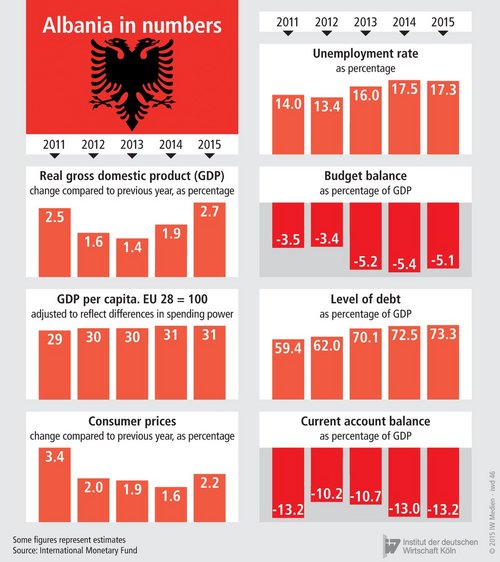The country has been endeavouring to officially join the European Union since 2009. Even with the prospect of accession, negotiations are far from being underway.

Albania: Seeking membership
Tirana erupted in cheers when the Albanian national team qualified for its first European Football Championship with a 3:0 win against Armenia in October. However, Albania doesn’t only want to draw closer to Europe on the football playing field – but also in the political arena. Its government submitted its first application for EU membership back in April 2009. But it wasn’t until June 2014 that the EU Council finally selected the country as a candidate for accession.
Negotiations have not yet begun. The EU is, however, already providing financial support for Albania’s reform process. An amount of 650 million euros from the Instrument for Pre-Accession Assistance has been earmarked for this process between 2014 and 2010. Additional funds are being provided by Germany, which has already sent Albania over 800 million euros in development aid since 1988.
And yet Albania, with its population of 2.8 million, remains one of the poorest of the West Balkan countries that has a prospect of acceding to the EU (see chart).
Albania’s per capita gross domestic product barely amounts to one-third of the EU 28 average.
The earning opportunities in Albania are correspondingly low, with an average monthly wage equivalent to 380 euros.
Nearly 43 per cent of the employed individuals in Albania work in agriculture and forestry or in fisheries. Just under one-fourth of the overall gross value added is generated in these sectors. The building sector accounts for 11 per cent of the gross value added, the industrial sector – including mining as well as energy and water supply – accounts for a good 14 per cent, and services account for 52 per cent.
The problem for Albania is its high rate of unemployment, which officially lies at 17 per cent, with the rate of long-term unemployed exceeding 11 per cent. The rate of youth unemployment, at 39 per cent, is particularly high.
The current account deficit – presently around 13 per cent of the economic output – can primarily be traced back to the country’s deficit in its movement of goods. In 2014 Albania imported goods valued at around 3 billion euros, while its exported goods were valued at only 925 million euros.
The imports were principally financed through foreign direct investments – the majority originating from Greece, Canada, Austria and the Netherlands – as well as through surpluses from the export of services and through transfers made to Albanian banks by Albanians working abroad (see iwd 42/2015). The latter, however, have declined in the wake of the financial and economic crisis.
For Albania to get a handle on the fragile public finances, the International Monetary Fund recommends that the country consolidate its budget, increase its revenues and reduce its energy subsidies.
More on the topic
![[Translate to English:] Das Gebäude des Weißen Hauses in Washington, D.C. in den Vereinigten Staaten von Amerika. [Translate to English:] Das Gebäude des Weißen Hauses in Washington, D.C. in den Vereinigten Staaten von Amerika.](/fileadmin/_processed_/c/1/csm_GettyImages-2161499385_White_House_Editorial_884306add8.jpg)
Trump or Harris or ...? What Europe must prepare for
A few months before the presidential election in the USA, Donald Trump has a good chance of being re-elected. On the Democratic side, the incumbent president has withdrawn his candidacy after a long period of hesitation, while Vice President Kamala Harris is ...
IW
Compendium 5.5: CO2 Regulation of Road Transport in Europe
With the Compendium CO2 Regulation in Europe, the IW has been providing the interested public with a comprehensive collection of data on the development of CO2 emissions from passenger car traffic in the European Union, as well as on the applicable regulatory ...
IW